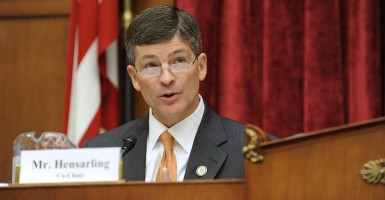Republicans and Democrats on the House Financial Services Committee faced off today at a hearing on the future of the Export-Import Bank and its role in subsidizing companies such as Boeing, Caterpillar and General Electric.
Rep. Jeb Hensarling, R-Texas, chairman of the committee, established the narrative early into the hearing that although the 80-year-old federal agency is a boon to big businesses, it significantly hurts those on Main Street. He said:
So who benefits? Overwhelmingly–and indisputably–it’s some of the largest, richest, most politically connected corporations in the world, like Boeing, General Electric, Bechtel and Caterpillar. In fact, in 2013, over half of Ex-Im’s financing went to a handful of Fortune 500 companies.
And big Wall Street banks apparently benefit as well. As reported in the press recently, one former JP Morgan and Citigroup banker said of Ex-Im’s credit guarantees, ‘It’s free money.’
So, if you’re a politically connected bank or company that benefits from Ex-Im, no doubt you would like it to continue. After all, it’s a sweetheart deal for you. Taxpayers shoulder the risk, and you get the reward.
Ex-Im, which provides taxpayer-backed loans to foreign companies and countries to buy U.S. products, has been the subject of contentious debate on Capitol Hill. Its charter expires Sept. 30, and unless Congress acts, the bank would close.
>>> At Least 74 Cases of Fraud and Corruption at Ex-Im Bank Since 2009
Hensarling and other conservative lawmakers, including House Budget Chairman Paul Ryan, R-Wis., argue the agency furthers corporate welfare and cronyism. Rep. Bill Huizenga, R-Mich., called Ex-Im the “Big Business Administration.”
Democrats and other Republicans, meanwhile, have found allies in the U.S. Chamber of Commerce and the National Association of Manufacturers in advocating for Ex-Im. They say the bank is crucial to helping small businesses remain competitive in the global market and is a good deal for taxpayers.
Ex-Im’s demise, Democrats warned today, would be detrimental to the U.S. economy as thousands of jobs could be lost.
“When this goes away, it will be a bad day for America,” Rep. Stephen Lynch, D-Mass., said. “It will be a bad day for the American worker.”
The Chamber of Commerce and NAM joined forces with more than 860 businesses for a well-funded campaign designed to rally support for the bank.
Rep. Carolyn Maloney, D-N.Y., said the coalition of supporters demonstrates that Ex-Im helps businesses — no matter how large. “Eight hundred sixty-five businesses and associations can’t be wrong,” she said.
>>> Why Is This Government Program Allowed to Hurt American Companies?
Witnesses opposing Ex-Im’s reauthorization included Richard Anderson, chief executive officer of Delta Airlines; Veronique de Rugy, senior research fellow at George Mason University’s Mercatus Center; and Lee Moak, president of the Air Line Pilots Association.
Supporters included Steve Wilburn, chief executive officer of FirmGreen, a green-energy company subsidized by Ex-Im. Wilburn hailed the bank as a crucial contributor to the success of the California-based business.
The agency, he said, “holds value to Main Street America by providing small businesses with room to grow.”
Ex-Im Chairman Fred Hochberg also testified. “We’re there when the private sector can’t or won’t,” Hochberg said.
But Anderson and Moak argued that the bank creates an uneven playing field for certain businesses in select global markets. Ex-Im, they said, helps foreign companies that go on to dominate the private sector.
Moak said companies such as Delta Airlines no longer can compete with the likes of Air India, which received subsidies from Ex-Im and flooded the international market, costing thousands of Americans their jobs.
Anderson agreed.
“Let’s be very clear about what happens with this financing,” he said. “It improves the profit margins of the top 10 companies in the U.S. that use it all the time.”
Hensarling criticized Democrats for proposing policies such as a minimum-wage hike that damage the U.S. economy but supporting Ex-Im, which allows a relative few politically connected companies to profit.
“The only way they can think to make us more competitive is to take taxpayer money and subsidize large companies,” the Texas Republican said.
Hensarling seems set on letting the agency’s charter expire without any action by his committee to save it. Fellow conservatives in the House feared leadership would bypass his Financial Services Committee and bring legislation to extend the life of Ex-Im directly to the floor, as it did in February with a flood insurance bill.
But Speaker John Boehner, R-Ohio, and Majority Leader Eric Cantor, R-Va., said they would defer to Hensarling and his committee.
The Senate could act first in passing a bill to extend Ex-Im’s charter.




























